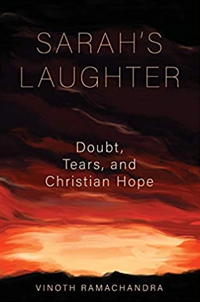
How do we make sense of the suffering in our world and in our lives? Is there a place for doubt and questioning? What does living with hope look like?
In Sarah's Laughter: Doubt, Tears, and Christian Hope, Dr. Vinoth Ramachandra invites us to be honest with the pain we experience, both personally and in our world. He shows us that walking with God includes the apparent paradox of lamenting, questioning, and living with uncertainty alongside our joy, faith, and assurance. He shows us how suffering is at the heart of God and fleshes out the nature of Christian hope. I’m especially encouraged by the idea of “hope as struggle,” as we long for and work towards God’s future amid the brokenness in our world.
Dr. Ramachandra holds both a Bachelor’s and Doctoral degree in Nuclear Engineering from the University of London. He is the Secretary for Dialogue and Social Engagement with the International Fellowship of Evangelical Students (IFES), a global partnership of over 150 university-level Christian movements.
Vinoth was the founder General Secretary of Sri Lanka’s Fellowship of Christian University Students (FOCUS) & Regional Secretary for IFES South Asia before transitioning to the senior leadership team of IFES.
Vinoth has also been involved with the Civil Rights Movement in Sri Lanka, as well as with the global Micah Network (a network of development and justice organizations) and A Rocha (a world-wide biodiversity conservation organization). He is also on the International Advisory Council of the Faraday Institute for Science and Religion, based in Cambridge, England. He is the author of several essays, articles and books including Gods That Fail, Subverting Global Myths: Theology and the Public Issues that Shape Our World, and Church and Mission in the New Asia. Vinoth was married for almost twenty years to his Danish wife Karin, who passed away in 2018.
Interested in hearing from the author himself? Listen to our bookclub conversation with Dr. Vinoth Ramachandra through our podcast.
Why, O Lord, Do You Hide Your Face?
1. What are your experiences of asking God “Why?” How comfortable are you with questioning God and bringing your pain and doubt to him?
2.The author defines lament in the following ways. Which of these aspects of lament resonate with you? Why?
a) Lament is the verbalizing of raw pain, giving words to suffering. It is not unbelief, but honest and painful speech where we are real before God.
b) Lament presupposes a relationship of trust and intimacy — the anguish we feel is precisely because we know God’s good character, but our experiences don’t match it and instead we experience the silence of God.
c) The language of lament enables the one who grieves to articulate the contradictions of experience.
d) Psalms of lament allow us to be honest and effect a transformation in us.
e) Verbalizing of pain has political agency — leads to a rebirth of hope and the will to resist.
3. How are our churches faring in incorporating lament to Christian worship?
4. What good outcomes might we see if we allowed space for lament in our worship services?
5. What are your thoughts on the practice of lament? How common or unusual is lament in the Christian communities you are part of? Why do you think that is?
Job and the Messiness of Theology & The Tears of God
1. In what ways have you seen skewed theology (or right theology in the wrong context) adding to the misery of the sufferer rather than alleviating his/her pain?
2. Are there ways in which your own vision of God has expanded during a season of suffering?
3. How do you respond to the reality that God suffers because of us? What specific aspects of God’s suffering are you struck by?
4. How has the vision of God who embraces pain willingly for our sake impacted you? How does this shift our perspective in the face of suffering?
5. What injustices/sufferings in our world is God is calling you to notice and “be converted to those at the bottom?”
6. How can what you are learning help you minister to those whose faith in God is shaken because of unjust suffering?
The Future Tense
1. Please read pages 98 and 99 contrasting the way of Adam and the path taken by Jesus — two radically different attitudes to life.
- How does the way of Jesus help us understand the nature of Hope that Ramachandra delineates in the rest of the chapter?
2. Hope as struggle
- What struck you about the vision of God’s future envisaged by the author? How do you respond to the idea of hope as living towards the future? What are our experiences of living in the tension of the “now” and “not yet”?
3. Hope as vulnerable action
- What are your thoughts about God’s power working in our weakness - as we go through physical/mental/emotional hardships?
4. Hope as a prophetic way of life
- How can viewing hope as imagining an alternative reality transform how we live in the present?
5. Hope as waiting / Hope in the darkness
- How do you respond to the idea of learning to live with unfulfilled desires / unanswered questions and living without many certainties?